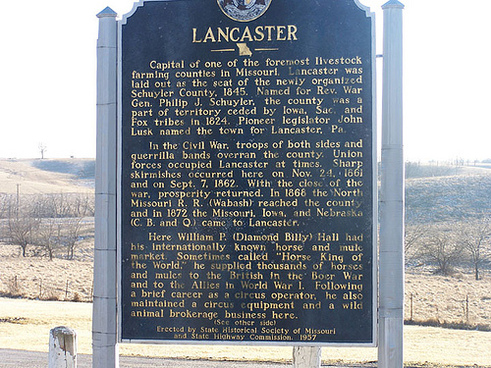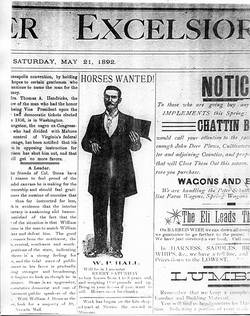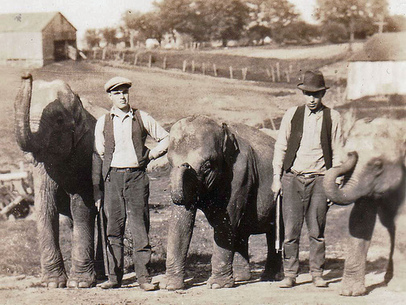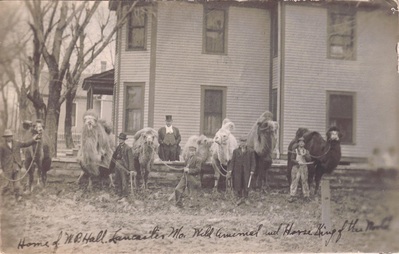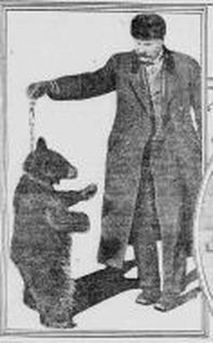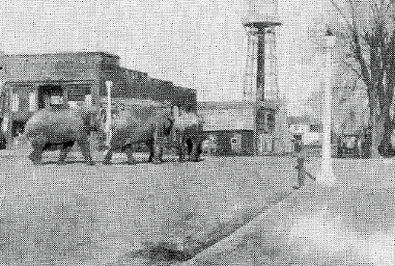"Mr. Hall played an important part in putting Lancaster 'on the map.' It was through the realization of his dreams that he made Lancaster
the center of wonder."
Lancaster Excelsior, June 30, 1932
|
Hall was generous and often thought of his community. He bought the majority of his horses and mules “in Schuyler County, Kirksville, and Memphis, Missouri; and Centerville and Bloomfield, Iowa,” according to bills of sale at The Circus World Museum. Hall's prosperiety rippled throughout Schuyler, allowing it to endure.
"Hall was a local employer, which meant cash flowed from all over into Lancaster. His work meant that there were always people from the outside coming into the community. In some ways he was like a small tourist bureau on his own. His purchases of supplies to maintain his operation also funneled dollars into the community." |
“One time he bought 120 [horses] in Memphis, Missouri, paying $16,000 to local farmers.” |
Hall contributed significantly to Lancaster's economy and added a cosmopolitan air to the town."
Rhonda Chalfant, A Recodation of Buildings in Lancaster, Schuyler County, Missouri, 2009
|
Hall made employment opportunities available to the locals. “The men he employed were given the chance of a lifetime to travel to places they had never heard of,” said Cline. He had just about everyone in town working for him, "including the blacksmith, farmers, bankers, and lawyers."
"He employed Lancaster harness-maker Jackson Towne to make harnesses for circus horses. During the winter, a large contingent of painters, car repairmen, and canvas-tent painters worked at Hall's farm, refurbishing equipment for lease or sale." |
|
“[Farmers] knew they could sell all they produced to Billy Hall.
It doesn't take long to see how large an economic boon
Hall was becoming to the surrounding area.”
Bob Cline, Bandwagon Magazine, January 2011
"Hall Bought From Farmers," Richard Starrett, Schuyler County Resident
Weathering Economic Hardships
In 1893, Reading Railroad declared bankruptcy, causing widespread panic. People withdrew money from banks, which lead to bank closures, business failures, and unemployment. However, "Schuyler County was spared from this panic because of Hall’s continued success and expansion of his horse business,” stated Cline. In 1929, the Great Depression began. If Schuyler had been a typical rural county, it would have died, but because of Hall's generosity, it survived.
"Lancaster was recognized throughout the country because of regular advertising in Billboard Magazine, the professional entertainment magazine, and in Bandwagon Magazine, the journal of the Circus Historical Society. And in 1932, Lancaster received national acclaim as the place "Where Circuses go When They Die" in this article in the Literary Digest Magazine about the Hall farm." |
Your browser does not support viewing this document. Click here to download the document.
"Where Circuses Go When They Die" The Literary Digest, Sept. 10, 1932
|
Exotic Animals
|
"I remember my mom telling me that when she was a little girl, Hall's elephants roamed around the town. There was this one time her
house started shaking and everyone ran outside thinking it was
an earthquake. It turned out to be an elephant scratching
his back on the side of their house!"
Dianna Kinney, Schuyler County resident.
"My Dad told me that his job as a boy was to get the milk off the porch as soon as the milkman brought it, because the elephants
would come and drink it!"
Lee Wheeler, former Schuyler County resident
"My Dad used to take elephants on walks around the square. He told me about a time when he took Sidney the elephant into the courthouse.
She walked all around and stuck her head into the offices
to see what everyone was up to."
William "Buckles" Woodcock, Jr., former Schuyler County resident
" My Dad, Tillman Houston, worked for Hall," Joan Jones, former Schuyler County Resident
